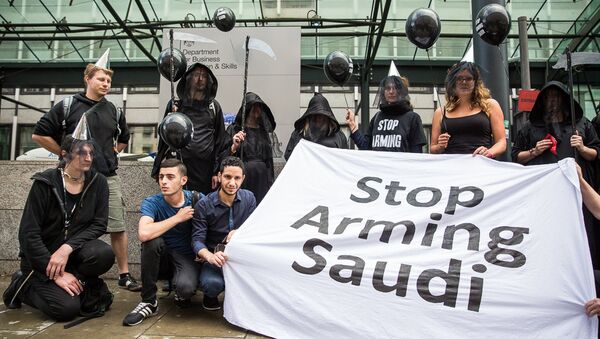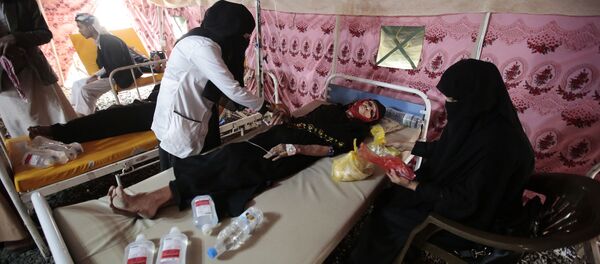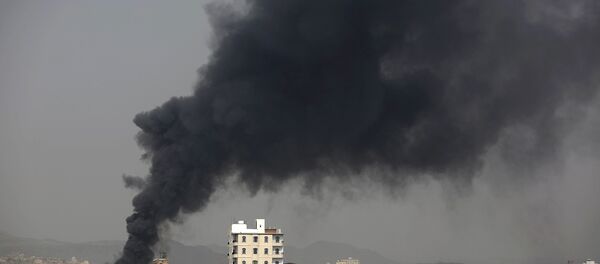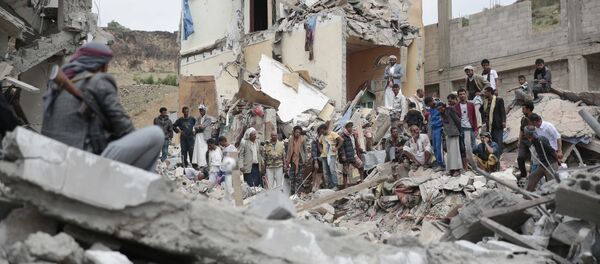Garland Nixon and Lee Stranahan on Sputnik Radio's Fault Lines spoke to Paul Kawika Martin, political and communications director with Peace Action, a grassroots organization that advocates for pro-peace, anti-war legislation. Nixon started the interview by asking Martin for a brief summation of what was happening in Yemen, and how the US was involved.
"Basically, a civil war sort of started in Yemen about three years ago and outside forces started to try to affect it: mostly the Saudi Arabia-led coalition. [They] wanted to affect what happened in Yemen because one, it's the poorest country in the Middle East; and two, it's a neighboring country. So they have been raining bombs on the populace there to try to affect what's going on — the UN has called it close to being war crimes. They've been doing actions such as double taps, which means you bomb one area, then you wait for civilians to come and help people, then you bomb again. These are all illegal under international law."
"But what people don't know is the US is supporting Saudi Arabia by selling them arms, refueling their jets, and even providing targeting information. The targeting information is supposed to help them not attack civilians, but they've actually been using this targeting information to attack civilians. This is the cause of the largest humanitarian crisis in the world: there's 7 million Yemenis on the brink of starvation, and just recently they've actually tightened the grip on the blockade of humanitarian aid going to the country. Unfortunately Congress has really done nothing."
Martin said that attempts to condemn the Saudi war in Yemen and deauthorize the US military assistance all died in Congress, aside from non-binding resolutions. Nixon noted that the Saudis enjoy bipartisan support in Congress, which makes it difficult for opponents of their policy to gain traction.
But the tide is slowly beginning to turn against the Saudis, according to Martin. "A year ago, 23 [senators] voted against arms sales to Saudi Arabia. Then a couple months ago this summer, 47 senators voted against arms sales to Saudi Arabia. Many are publicly saying this relationship is not in the best interest of the US, even if you don't care about the humanitarian issues… even our national security issues are [being cited] because these attacks are being seen by people in Yemen as coming from the US. They're US-made bombs, they're US targeting, and it's creating more terrorists. That's been proven over and over again, that more al-Qaeda type cells are coming out of Yemen because of these attacks in Yemen."
"Saudi Arabia's hired some 22 lobbying companies, we don't actually know the extent of the lobbying that's going on. There's a lot of money flowing into Washington, DC, to put pressure on members of Congress, and unfortunately that has been working. There's a huge amount of concern, but the lobbying effort has unfortunately quelled actual true action by Congress to stop what's going on in Yemen."
Stranahan asked Martin what realistic solutions there were to the crisis in Yemen that Washington could help implement. "There is no military solution here," he replied. "Saudi Arabia actually knows that, so they need to figure out a political solution. If you look at history, any type of civil war is only been solved by some sort of a political accord. Either you start that now or you start that five years from now with another million innocent people dead."
"So the issue is the US should be using its leverage on Saudi Arabia, which we do have, to get them to the negotiating table for some sort of political solution. The trouble is it seems like the Trump administration has bought into Saudi Arabia and has become its best friend. The Obama administration had very bad policy here, but this is not a partisan issue."
Martin also called for an end to US arms exports to the Middle East. "The last thing the Middle East needs is more weapons. That should be one of the first things we need to stop: the flow of weapons there. We should start to figure out how we can have some power sharing agreements in the Middle East right now. There's no easy solution that I'm going to be able to say in 60 seconds, but certainly the one thing is: let's stop the flow of arms there."
"There needs to be pushback on Saudi Arabia. It is happening, slowly but surely, but unfortunately starving humans can't wait for 'slowly but surely' on this issue."







